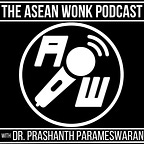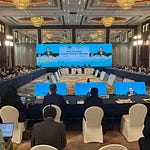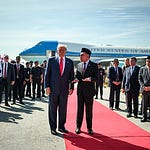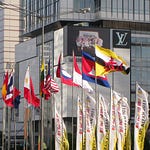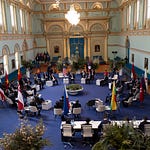[Note: This is the free preview within the dedicated podcast section of the ASEAN Wonk website, with the full version in a post published on December 12, 2024 available to our paying subscribers. This is not meant to serve as new content and is part of our free preview content within the dedicated website podcast section].
INTRODUCTION
ASEAN Wonk: Welcome to the ASEAN Wonk Podcast, where we bring you expert insights and regional perspectives on Southeast Asia and Indo Pacific geopolitics and geoeconomics. I'm your host Dr. Prashanth Parameswaran. If you haven't already, do subscribe to the ASEAN Wonk platform at www.aseanwonk.com so you don't miss all our posts. Our guest today is Ambassador Scot Marciel. He spent over three decades working in the US government, including as US ambassador to Indonesia, Myanmar and ASEAN.
We start our conversation talking about the current state of U.S-Southeast Asia relations. Make sure you watch, listen or read the full episode as we go through a range of other subjects, including datapoints to watch in 2025 and the U.S. approach to evolving flashpoints such as South China Sea and Myanmar.
Note: The transcript that follows the above free clip preview has been lightly edited for clarity and organized into sections for ease of quick browsing. For all ASEAN Wonk Podcast episodes, full video and audio podcasts, along with edited and sectioned transcripts as well as block quotes, will be a premium product for our paying subscribers, but we will include a short free transcript preview and a clip for all readers to maintain accessibility. Paying subscribers can find the rest of the full transcript and the full video podcast right below the paywall. If you have not already, do consider subscribing, and, if you have already done so and like what you see and hear, do consider forwarding this to others as well who may be interested. Thank you for your support as always!
GRADING THE BIDEN ADMINISTRATION’S SOUTHEAST ASIA APPROACH
ASEAN Wonk: So welcome to the ASEAN Wonk Podcast, Scot, thank you for joining us. And we can get started with our conversation. There's obviously a lot of focus on what an incoming Trump administration would mean for Southeast Asia. But I wanted to start first by asking your views about how the Biden administration actually has performed during its term in office. There have been some clear wins, including upgrades with Indonesia and Vietnam, the upgrade and the relationship with ASEAN, as well as the minilaterals cultivated with the Philippines. But there have also been some challenges on the trade front with Indo-Pacific Economic Framework (IPEF), and some issues in terms of the balancing between ideals and interests and sensitivities in Southeast Asian countries. As somebody who's been a practitioner for over three decades, looking at these actual relationships, how would you go about grading the Biden administration's record on Southeast Asia? And you can use whatever scale you want, whether it's one to ten or alphabet letters and so on and so forth.
Ambassador Scot Marciel: Yeah. I think overall, I would give the Biden administration pretty good marks. You know, on a scale of one to ten with ten being ideal, probably somewhere in the seven range. Positives are some of which you already mentioned: upgrading relations, some of the formal double upgrade with Vietnam, even though as a diplomat, you know, we used to put a lot of effort into those things: they're more symbolic than real — or they can be more symbolic than real — but I think there's some real substance behind some of them. Certainly, the one with Vietnam, and I hope the one with Indonesia. So those have been positive. There was more consistent high level engagement under the Biden administration than there was with the previous administration.
On the negative side, trade, the lack of trade initiatives — which is a bigger problem than a Biden administration problem — but the US political unwillingness or inability to engage in trying to negotiate new trade agreements is a real setback or at least a real negative, I would say an ongoing negative. And also, I think President Biden's failure to show up at the last two summits. You know, people sort of say, well, these summits, they're just talk shops. But to me, in my experience, showing up at those levels is really important to Southeast Asians, Southeast Asian leaders and governments because they use it a little bit to gauge the level of US commitment. So if you miss one at every ten years, it's not that big a deal. But if they see patterns of more engagement or less engagement, it causes them to either increase or reduce their confidence in the US as a long term partner. So I'd take off some points on that front. Overall, pretty good.
DEFINING THE SOUTHEAST ASIA STAKES FOR THE INCOMING TRUMP ADMINISTRATION
ASEAN Wonk: Right. And to your point, some of these issues are unique to the Biden administration; others are more systemic problems with US policy. And I think on trade, as you said, these are issues that have to do with domestic pressures on whatever administration is going to come to office as well. I wanted to also talk a little bit about the stakes for the incoming administration. I think if you look back to the first Trump administration, there were some issues and challenges on Southeast Asia, but I think one thing that the administration did do was some clarity on China policy. And I think some countries in Southeast Asia looked at that favorably, others looked at it with a little bit more suspicion. But there was this dynamic of US China competition that we did get a lot more clarity on in the Trump administration relative to, say, the second term of the Obama administration.
But I think at the same time, even though it's just been four years, there have been quite a number of things that have changed in terms of the US position, the dynamics in Southeast Asia and just global dynamics in general. You can look at what happened in Ukraine, you can look at the crisis in Myanmar. But also, other notions about post-pandemic growth and sectors like artificial intelligence and supply chains — a lot of these things are pretty new relative to where the first Trump administration was. Most of the leaders in Southeast Asia are actually new even though it’s been just a few years. And actually, it's a really interesting dynamic on US China competition. US economic performance in the past couple of years has actually been quite good and China's economic performance has actually slowed down relatively speaking. You've advised US officials at the highest level of government about the stakes for the United States in Southeast Asia. I'm wondering, in terms of the incoming Trump administration — with the caveat that we still don't know who the cabinet level officials are going to be and what the makeup is going to be — what's your top line about the US stakes in Southeast Asia now relative to four years ago when the Trump administration left office?
Ambassador Scot Marciel: Yeah. It's a great question. I'd say, first of all, the economic importance of Southeast Asia has become even greater, and continues to be greater. And particularly when you look at supply chains, which was a focus of the Trump administration and of the Biden administration, and I expect will be a focus of the new Trump administration even if it's overall not enthusiastic about trade per se. So I think there are some real opportunities there. You look at, for example, President Biden's visit to Hanoi talking about supporting Vietnam's effort to become a key cog in the semiconductor supply chain. Obviously, critical minerals in places like Indonesia and Philippines, etc. So there are some some real opportunities there, and the region's important. I mean, overall, as you know, ASEAN collectively I think, is the fourth or fifth largest US trading partner these days, and I think four of the ten ASEAN members are in the top twenty too. So economically, it's really important. Politically, it's important just because it's such a dynamic and diverse region. If things go badly, it's gonna be a problem for the region and the US and vice versa.
And then there's vis-a-vis China. And this is one of the most challenging things for US policy makers. You know, people say — I say — we should engage with Southeast Asia on its own merits. And I think that's really true because for the reasons I just mentioned and others, even if China didn't exist, Southeast Asia would be a really important partner. But even in the context of looking at US-China competition, I think there's a little bit of a false dichotomy offered sometimes between, well, engage with Southeast Asia on its own merits or through the prism of China. And I think the reality is that you can engage with Southeast Asia on its own merits while still having China very much in your mind. So when the president or the secretary of state sits down with a counterpart from Singapore, Vietnam, Indonesia, wherever it may be. Ideally, they're talking about the bilateral relationship, shared interest, trade investment, health cooperation, security cooperation. They both probably have China in the back of their minds. That's okay. There's nothing wrong with that.
“[I] think there's a little bit of a false dichotomy offered sometimes between, well, engage with Southeast Asia on its own merits or through the prism of China. And I think the reality is that you can engage with Southeast Asia on its own merits while still having China very much in your mind.”
But where I think the US goes wrong is it tends sometimes to assume that the countries of Southeast Asia see China the same way we do, which they don't necessarily. And also assumes that the first thing to do when you start off a meeting is talk about how problematic China is, which generally doesn't go over very well. So I think that requires some nuance: to be thinking of Southeast Asia partly in the context of US-China relations, not wholly, but to not make the discussions all about China. And that's a level of nuance that, frankly, I think is gonna be a question mark for the incoming Trump administration and will depend to a certain extent on both who's appointed, but also who has the lead. You get, you know, somebody like Secretary of State Rubio — I don't know him personally — but at least has some background in foreign relations and foreign policy as opposed to someone who may be less experienced and may have a harder time finding that kind of nuance.
MINILATERALS, ASEAN ENGAGEMENT AND BILATERAL PATHWAYS
ASEAN Wonk: Yeah. I think that's an important point that you make about the balance between US-China competition and seeing the region for its own sake, particularly because, as you know, this notion of the region being viewed from the lens of other items — whether it's terrorism or the Cold War — is something that goes back decades. So it's definitely something that's really important.
You're former ambassador to ASEAN. And I know you were also instrumental in some of the big ideas in US policy in Southeast Asia, including having a resident ambassador in the region as well. We're at a really interesting time in terms of US engagement with ASEAN. ASEAN's challenges have always been quite familiar and longstanding, in spite of the fact that as you've written, ASEAN's original purpose was actually managing tensions and issues within the region among Southeast Asian states, and it succeeded there. But in terms of the big issues — flashpoints like the South China Sea or Myanmar — it's been a little bit less successful and there are more challenges there because they're difficult issues. We're also at a really interesting point where in US policy, we're seeing a lot more traction on minilaterals, including some of the minilaterals involving the Philippines — the US-Japan relationship with the Philippines, for example, and that trilateral — but also AUKUS, the Quad, so on and so forth. And there's often this dynamic which you've mentioned earlier of false choices. And I think there's one in this notion of bilateral versus minilateral versus multilateral. And obviously, it's a balance, it's a calibration. I'm wondering, as somebody who's been a practitioner in this space and ambassador to ASEAN, how do you see the balance currently that the US has been navigating between bilateral, minilateral, multilateral pathways?
Ambassador Scot Marciel: Yeah. I think bilateral has always been the top priority. And I think that's almost inevitable, and it’s mutual. You know, when we're engaging with Vietnam or Indonesia or Thailand or Cambodia, eighty percent of the discussion is going to be on bilateral relations, and that's fine. I don't think that gets in the way of US relations with ASEAN.
When you get into the minilaterals, it gets a little bit more challenging because ASEAN meetings are boring and often not — at least the official meetings — not incredibly productive. And I think a lot of friends in ASEAN would agree with that. So that's part of the reason it's hard to get senior officials to say: let's fly all the way to Southeast Asia and go to an ASEAN meeting. But as you know, there's lots of value in engaging with not only the ASEAN members, but all the others who come to the region and remembering that ASEAN serves a very useful purpose even if it struggles in some of the areas you mentioned. On the minilateral front, I think when I look at the Quad, AUKUS, some of the things with the Philippines, sometimes those things cause some nervousness among some Southeast Asian countries for sure. That's always going to happen, but I think you can mitigate it to a large extent by better communication. So, you know, folks in Jakarta or KL or Bangkok shouldn't be reading about these things for the first time in the news. You sit down with them ahead of time and say, look, this is what we're doing. Here's why we're doing it. It doesn't take away from our commitment to working with ASEAN. So more discussion, more communication is, I think, the way forward on that. Again, it won't completely solve the problem, but I think it helps. And you look at ASEAN members, I mean, they're doing minilateral stuff too. So minilaterals by itself isn't a problem. It's when the big power comes in — whether it's the US or another — and suddenly announces we're doing x, y, and z, it's gonna raise some suspicion.
ALLIANCES AND PARTNERSHIPS
ASEAN Wonk: I’m wondering how you think about the question that you mentioned a little bit earlier with respect to other US partners in the region. So one of the big US strengths if we think about US China competition is the US not alone. It’s got an extensive alliance and partnership network, with countries like Japan, Australia, Canada, Korea, so on and so forth. I think on the one hand, if you grade that as an alliance and partnership network, for sure, it's an absolute strength.
At the same time, I do think that over the past a few years, as the Trump administration takes office, we are seeing a lot of US partners and allies actually do more with Southeast Asia than the US is doing with Southeast Asia. And that almost raises the question among Southeast Asian states: okay, we know that you're doing a lot with your allies and partners, but we're interested in actually what are you doing. We know the Japanese are doing X and we know the Australians are doing Y, but what are you doing on economic engagement and diplomatic engagement? How do we think about the way in which we're calibrating the expectations for US engagement with US allies and partners, and then particularly on areas like economic engagement and diplomatic engagement, where expectations are for the US in particular? How do you make that sort of adjustment and balance in terms of thinking about that?
Ambassador Scot Marciel: Good question. I think, as you said, Japan, Korea, Australia, India — although it's not an ally — all are engaging more and building closer relations with Southeast Asia. And, of course, they're not doing it at the US behest. They're doing it as independent actors and sometimes with a very different approach than the US. I think that's a positive, and I think it's a positive for the US because the goal for the US from my perspective isn't, you know, necessarily being number one. But geostrategically, the key interest for me for the United States and Southeast Asia is doing all we can to ensure that the countries of Southeast Asia maintain full sovereignty and freedom of maneuver. And the more they have good viable, strong relations with a range of other countries, the more likely it is that they're able to do that. But you're right. If Japan goes in and offers aid or builds a port or Korea does build a power plant or what have you, that's great. But it doesn't count as in Southeast Asian eyes as the US doing something. Nor should it.
“If Japan goes in and offers aid or builds a port or Korea does build a power plant or what have you, that's great. But it doesn't count as in Southeast Asian eyes as the US doing something. Nor should it.”
And so the US has to find ways to do more. And some of that, we're doing a lot, but we don't do a very good job of talking about it. Health. You know, we've invested over five billion dollars in health research and cooperation in the region since the early 2000s. It's really good stuff and it's all grants. It's really positive. Very few people know about it. People know a lot more about our security cooperation. That's a strength and I think that will continue, but it's insufficient. And diplomacy, we're overall very active in the region. It's on the economic side where we're perceived as operating more weakly. And there, you know, the numbers aren't bad. But when the US pulled out of TPP and doesn't move on other trade initiatives and doesn't have any way to compete with Belt and Road and so on, a lot of countries are like, what are you guys doing? And this is where I think the US has an opportunity.
I don't know that the Trump administration is gonna wanna take it on. For example, the Just Energy Transition Partnerships with Indonesia and Vietnam. Okay. Climate change is probably gonna be a dirty word again in the next administration. But doing energy business, in this case, clean energy business, shouldn't be a dirty word. And if the US working with others can deliver on some of these partnerships in a way that's tangible and really helps, the countries move toward cleaner energy mix, then it's not only an economic win and an opportunity for US companies, it's also a geostrategic win because you show that you're delivering on something important. It's never gonna match nor does it need to match Belt and Road. It just needs to show that we're able to do some things. And so I would push hard for implementing as much as possible these Just Energy Transition Partnerships, clean energy, and also in the telecom and digital realm where we have strengths. That's where we need to deliver. And if we don't, we're gonna lose some influence. There's just no way around it.
DATAPOINTS TO WATCH IN 2025 IN US SOUTHEAST ASIA POLICY
ASEAN Wonk: Right. And I think you make an important point there about sectoral cooperation. Whether it's energy — maybe it's not as much climate change, but there's a whole lot of opportunities on natural gas, for example, that some people are already talking about within this administration — but also semiconductors, AI, and a lot of the stuff you talked about earlier. For example, on critical minerals, where Indonesia has directly come to the US and ask for opportunities there, even though there's some challenges as well. That's a really important point that you make that not just about aggregate cooperation, but it's also about delivering on key sectors for economic growth.
I'm wondering if we could shift a little bit to looking ahead to 2025. As I mentioned at the outset, there’s already quite a lot of speculation about what we might expect in the first year of the Trump administration. And as we discussed earlier, a lot of this is maybe a little bit premature, given we don't really know the makeup of the administration — the personnel for example. But I think in terms of the broad contours, we can at least say that, within the first year of an administration, there are familiar dynamics: in terms of new strategy documents that come out, this kind of familiar competition we have among Southeast Asian countries for who gets the first White House visit or engagement with the administration. But frankly, it's also an administration where we have a bit of uncertainty as well on things like tariffs, China policy, for example. A lot of that is rhetoric, and we don't really know how that's going to manifest in terms of reality. But I'm wondering, as somebody who has been a practitioner in the space, what are the datapoints you're looking for in 2025 with a new incoming Trump administration on Southeast Asia that will tell us a little bit about where the administration is headed for the next four years?
Ambassador Scot Marciel: Yeah. A couple of things…
[Note: This is the end of a free preview podcast, with the full version in an earlier post published on December 12, 2024 available to our paying subscribers. This is not meant to serve as new content and is part of our free preview content within the dedicated website podcast section].


